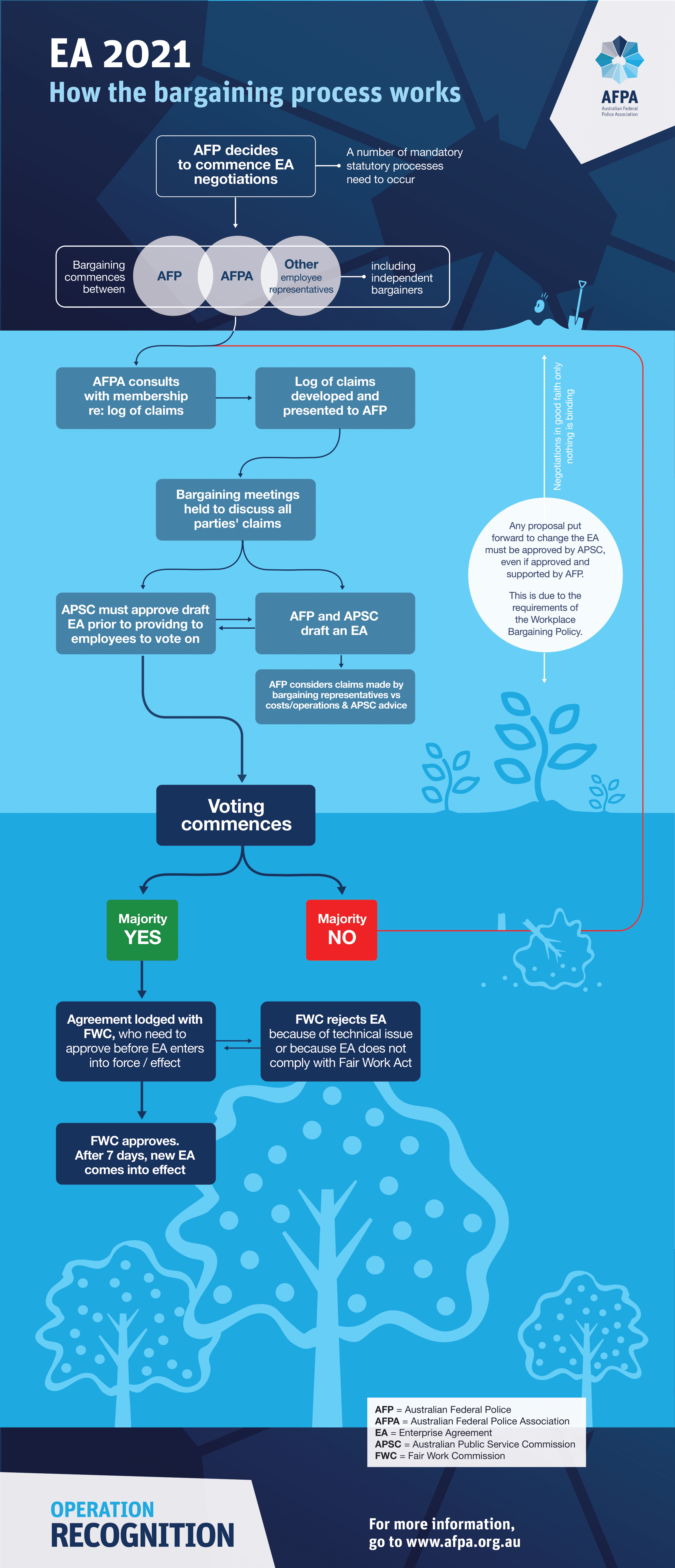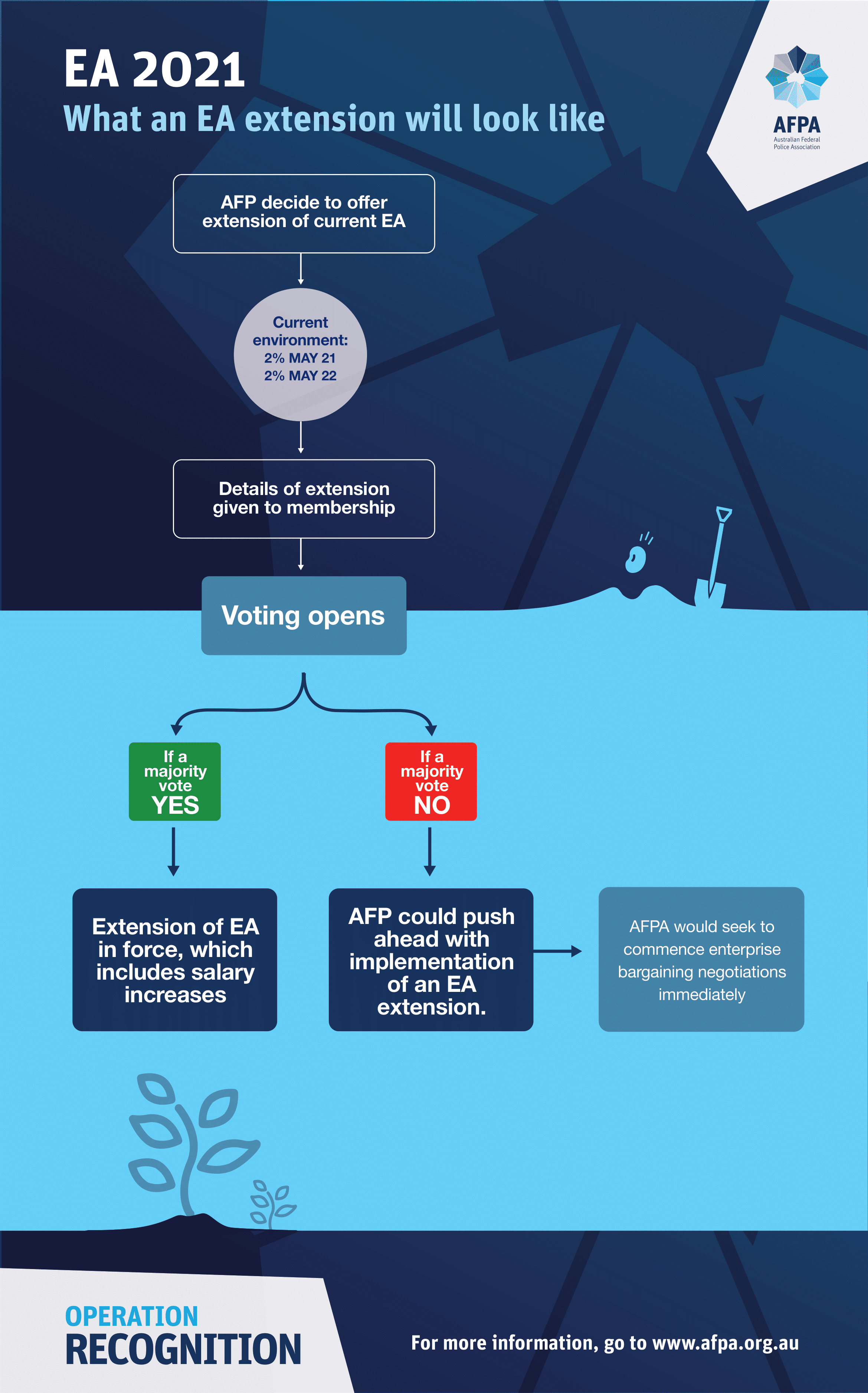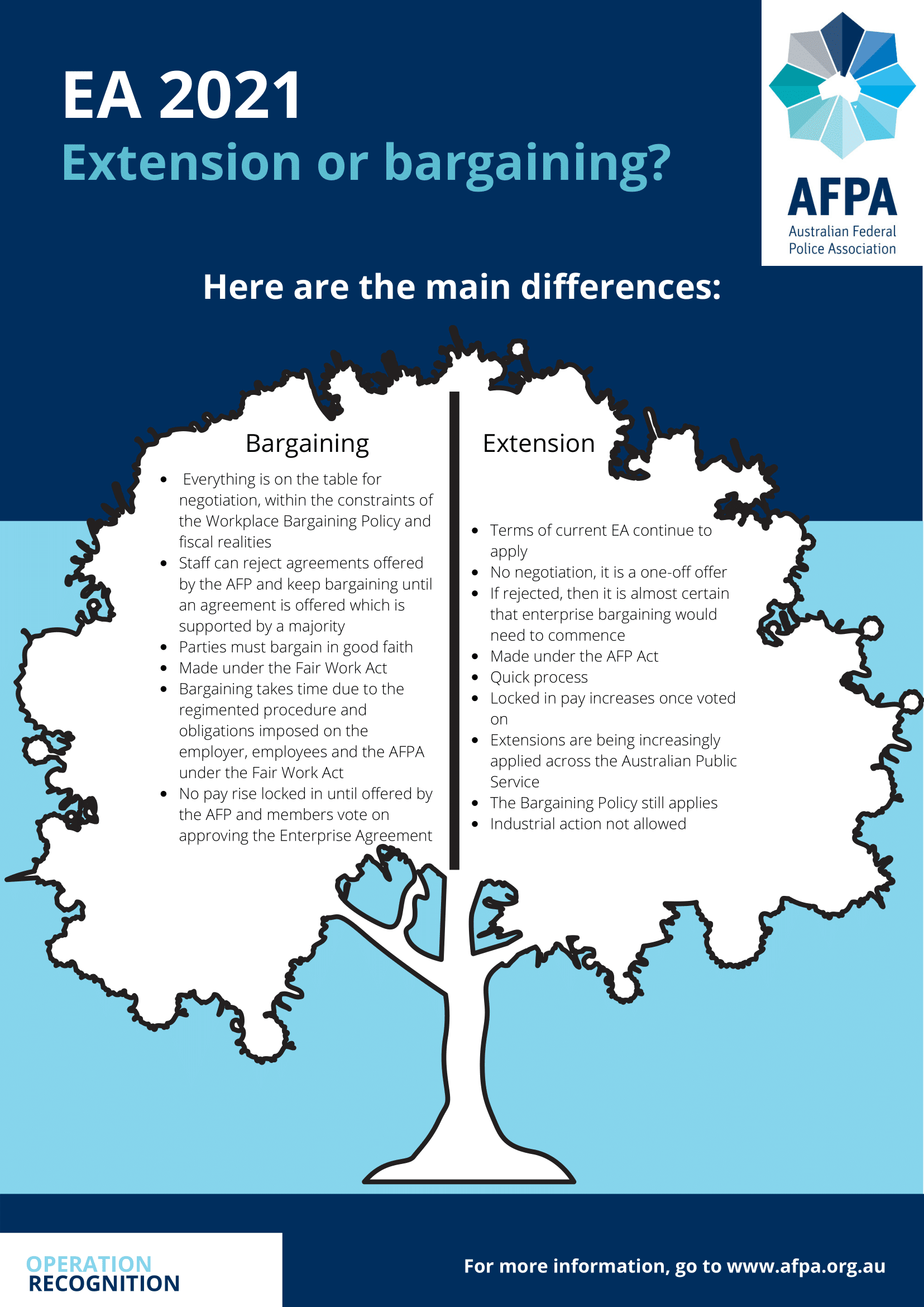
Enterprise Agreement
Frequently Asked Questions
The Federal Government’s wage freeze will be for a period of 6 months from the beginning of the next agreement, whether that is a new enterprise agreement or an extension of the current EA / ELEA through a workplace determination
We are still exploring this. We would encourage you to contact us to for an in-confidence chat. Please send us an email via afpa@afpa.org.au with your best contact details, and we’ll get back to you.
No. If the Workplace Determination comes into effect, the AFPA can at any time during the life of the Workplace Determination seek a majority support determination from the Fair Work Commission on the grounds that a majority of our members want to bargain for a new enterprise agreement. If approved by the Fair Work Commission, a majority support determination would require the AFP to commence the process for bargaining for a new enterprise agreement.
In the event of a successful majority support determination application, the AFP would end the workplace determination to allow for bargaining to proceed. The underlying EA would continue to operate until a new arrangement is agreed and any further pay rises would only be following the conclusion of bargaining and the commencement of a new enterprise agreement.
With everything going to plan (and assuming we have a ‘new’ or ‘extended’ EA / ELEA in place), November 2021.
The AFPA asked for additional recreational or mandatory recreation leaves days, and this was rejected by the Federal Government and Australian Public Service Commission (APSC). The reason was that the APSC see this as an enhancement to the Enterprise Agreement – which isn’t allowed under the Workplace Bargaining Policy.
The AFPA asked for this and it was rejected by the Federal Government and Australian Public Service Commission (APSC). The reason was that the APSC see this as an enhancement due to the compounding affect – which isn’t allowed under the Workplace Bargaining Policy.
No, this has been rejected by the Federal Government.
We acknowledge that the EA and ELEA are far from perfect and have quite a few imbalances. Unfortunately, in Australia’s current fiscal climate, we believe that now isn’t the time to go into bargaining. By bargaining, we risk losing the maximum pay rise of 2%, along with other conditions.
The only other option to move forward is via bargaining. By bargaining, we risk losing the maximum pay rise of 2% (along with other conditions). The Workplace Bargaining Policy is not your friend, and it is a possibility that the Federal Government could change the maximum pay increase to a smaller amount.
Salary increases are limited by the Federal Government’s ‘Workplace Bargaining Policy’. The Policy sets a 2% per annum average on Federal Government Departments and Agencies salary increases
That is a good question and one that neither the Federal Government nor the APSC has been able to answer.
No, the two go hand-in-hand. To receive your 2% pay rise, you’ll need to accept the wage freeze. This has already been approved by the Federal Government.
What has the AFPA been doing since National Council 2019, in relation to bargaining for the next EA?
At the 2019 National Council, the delegates passed a motion asking the AFPA to begin preparing for bargaining well before the nominal expiry of the EA2017-2020 on the 24th of May 2021.
The AFPA established an Operational Committee responsible for preparing the for bargaining as soon as practicable and well before the expiry deadline.
In April 2019 Angela Smith wrote to then Commissioner, Andrew Colvin, seeking a commitment to promptly engage with the AFPA concerning bargaining. Commissioner Colvin advised the AFPA in May 2019 that he would commit to “structured discussions” around the EA, commencing in late 2019. Commissioner Kershaw followed through with this commitment. Discussions took place between the AFPA Bargaining Team, AC Scott Lee (when he was Lead Negotiator for the AFP) and, later, DC Neil Gaughan in late 2019 and early 2020.
At the same time, the AFPA engaged Essential Media to assist with creating and rolling out Operation Recognition. A series of discussion papers were drafted around issues affecting the membership, including the EA, as part of Operation Recognition.
Membership surveys were conducted – primarily on potential deficiencies in the EA, how the EA had impacted on operational outcomes and ideas for the next EA.
Feedback has also assisted us with the preparation of a provisional log of claims, should bargaining commence.
The AFPA identified that the most significant barrier to meaningful change to the current industrial framework (the EA) is the Federal Government’s Workplace Bargaining Policy. As part of the campaign around Operation Recognition, the Association lobbied for the AFP to be exempted from the Workplace Bargaining Policy. The AFPA wrote to and engaged with various Federal Ministers, the AFP Commissioner, and the Australian Public Service Commission (APSC) seeking an exemption.
In early 2020, the AFPA Bargaining Team held a series of musters across the country updating members on the AFPA’s preparations for EA bargaining and, in particular, the difficulties caused by the Workplace Bargaining Policy. These were held in most offices and stations prior to the COVID pandemic, which then restricted our movements and prevented completion of the musters.
Additionally, the catastrophic bushfires across Australia in the summer of 2019/2020 significantly affected the Federal Government’s focus and budget position. This was compounded by the pandemic and the resultant economic recession which we are now living through. Likewise, the AFP has been an agency central to the operational response to the bushfires and pandemic.
What is the Workplace Bargaining Policy?
Public Service agencies and unions have been hamstrung by the current Federal Government’s workplace bargaining policy.
In a nutshell, the policy:
- Bans “enhancements” to existing conditions,
- Mandates that salary increases must be funded by improvements to productivity,
- Restricts salary increases 2% per annum; and
- Prohibits modifications to the top points of salary increments.
In short, this policy stops “improvements” to Public Service enterprise agreements, destroys wage growth, and erodes the industrial conditions of employees in the name of “budget repair”.
All stated above
While the Federal Government maintains this draconian policy, the hands of the AFPA and AFP are tied. In the last round of bargaining, sensible and reasonable suggestions were rejected by the APSC and the AFP, due to their classification as an “enhancement”.
A copy of the Policy can be accessed here: https://www.apsc.gov.au/workplace-bargaining-policy-2018
Where is the AFPA currently up to with its lobbying?
The AFPA has done considerable work throughout 2019 and early 2020 in preparing to bargain for a new agreement. This includes the Operation Recognition campaign and the preparation for a log of claims. The AFPA has also engaged with our membership on several occasions in the last year through surveys, which have provided beneficial insights into what members want in an EA, and ideas to make the EA better.
What is the AFP doing?
Throughout early 2020 DC Gaughan held a series of musters across the country. We understand that during those musters DC Gaughan raised the idea of “rolling over” the EA. In effect, the current EA would remain in place but with guaranteed pay increases to occur after the nominal expiry.
The AFP is yet to decide if it will go down the path of “rolling over” the EA.
What is a “rollover” and how does it work?
A “rollover” of the EA is different from bargaining for a new EA. Under section 27 of the AFP Act, the Commissioner has the power to determine the remuneration and other terms and conditions of employment for AFP employees. This is called a “determination’ and can apply, adopt, or incorporate provisions of any current EA covering AFP employees.
The use of this determination power, instead of bargaining, has occurred at several Federal Government departments and agencies. A similar provision exists in the Public Service Act. It has become common to use the determination power over the past 18 months with the Public Service, driven chiefly by the restrictive Workplace Bargaining Policy and the efficiency dividend imposed on most departments and agencies.
Determinations are relatively short documents and expressly state that the EA will continue to apply, and making a provision for salary increases to occur after the nominal expiry of the relevant EA. In effect, it extends the life of the EA and provides for additional salary increases to occur when not initially bargained for in an EA.
Where determinations have been enacted in other departments and agencies, employees will vote on whether to support a determination being put in place. We understand that, if a majority agrees, then the AFP will implement the determination. Please note that although the Commissioner can impose a determination on his workforce ((under section 27 of the AFP Act), this is not the practice that has occurred within the Public Service so far.
If the AFP proposes to make a determination under section 27, can we ask for enhancements (such as an operational allowance) to the current EA or a pay increase greater than 2%?
No. Determinations are still subject to the Workplace Bargaining Policy and the restrictions imposed on enhancements and maximum salary increases. In addition, a determination is not the result of bargaining or negotiation but is instead an offer put by an Agency Head to employees to avoid the bargaining process.
Any changes to the determination would require negotiation.
Does the AFPA support a determination made under section 27?
We understand comments made by DC Gaughan during musters imply that the AFPA is supportive of a determination. While we have indicated to DC Gaughan that we would consult our membership with respect to a determination under section 27, we have never said that we were “fully supportive”. We have said we have socialised the idea of a ‘rollover’ or as we prefer to call it, ‘extension’ of the EA.
At this stage, we neither support nor oppose the idea, simply because we haven’t been formally provided with any specifics about it – most crucially around how much the guaranteed salary increase would be, when the salary increases would take effect and the length of any determination made.
The AFPA’s position is always guided by the views of the majority of our membership, and the particular circumstances which exist at the time. Our recent survey results indicate that the overwhelming majority of our members are supportive of a determination being made.
What if the Federal Government eases the Workplace Bargaining Policy following a determination being put in place by the AFP?
At any time during the life of a section 27 determination, employees can seek a “majority support determination” from the Fair Work Commission (FWC). A majority support determination is an order from the FWC where a majority of employees want to bargain with their employer, and the employer has not yet agreed to bargain or initiated bargaining. If such an order is made by the FWC, an employer is required to commence bargaining.
What happens if the AFP offers a determination with a salary increase that is less than 2% or provides for a delayed salary increase?
If the majority of members support a proposal, the determination will be put in place. The difficulty is that a determination is not bargaining, and it is challenging to negotiate whether a specific salary increase should be effective from a particular date.
Much will depend on whether any changes are made by the Federal Government to restrict maximum salary increases per the Workplace Bargaining Policy, or whether further attempts are made to defer salary increases (which has occurred across the Public Service).
In response to the pandemic, the Federal Government issued a determination deferring Australian Public Service salary increases for six months. While the determination did not directly affect the AFP, the Federal Government did stress that it wished for non-APS entities (including the AFP) also to defer salary increases.
As most of you would now be aware, DC Gaughan has issued an All Staff email about the pressure being applied by Government to have the AFP accept the salary deferral imposed on other Commonwealth entities. While we understand that no formal decision has yet been made, whether this is imposed or not will be a significant factor for members in deciding whether or not to support a determination.
What happens if a majority of AFP employees vote “no” to a determination?
The AFP could push ahead with making a section 27 determination. However, it’s not likely that the AFP would do this, as this has not occurred in the other Public Service departments and agencies who have sought to make determinations. Trying to impose a determination on members after a majority voted not to support one would cause significant anger in the workforce.
Therefore, bargaining would commence for a new EA if a majority of AFP employees voted no.
How much would a 2% pay increase cost the organisation and how would it be funded if a determination were put in place and there were no changes in other conditions?
We have calculated the rough costs of 1% and 2% increases. Please note, these figures are not 100% accurate, as we were unable to determine how many professional staff have been assigned to the Operations or Rostered Operations working patterns. Likewise, pay increases include increases to your base salary, composite, overtime. Some allowances also increase in line with increases to salary.
- A 1% salary increase for the general workforce would cost the AFP approximately $6,228,850.
- A 2% salary increase for the general workforce would cost the AFP approximately $12,457,700.
In the event of a section 27 determination, it is our understanding that the 2% annual salary increases will be funded by savings realised from not entering the bargaining process.
We will seek to provide further and more accurate calculations from the AFP concerning this.
Would the AFP look at taking composites away if we bargained for a new EA or if a determination were made?
The Commissioner, since the introduction of composites, has always retained the absolute power to assign working patterns, and therefore which areas receive or do not receive the composite. While we cannot control or influence any changes that might be made to which persons are assigned to those patterns attracting composites, no changes can be made under a section 27 determination as to the level of composite and what the composite “buys”. In the past, the AFPA has fought hard for particular work areas assigned to specific work patterns.
Removing work areas from work patterns has also burned the AFP. For instance, the removal of areas from the high-volume operations composite has, in our view, been a failure. It has caused problems for members working in certain areas and impacted operational outcomes, likely costing the AFP significantly more money in overtime and penalties. This would be the case if the Commissioner removed work areas from the composite indiscriminately.
What is the current timeframe for a potential determination?
We have not received formal notice of when the AFP will decide to go to bargaining or seek to make a determination.
We will formally write to the Commissioner and DC Gaughan within the next two weeks to confirm timeframes. Our view is that a decision should be made before the 1st of September 2020.




